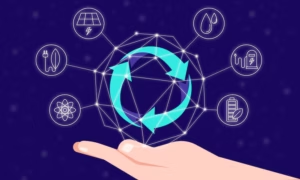In a bold and timely exploration of sustainability and economic resilience, Nigerian researcher Patience Okpeke Paul has emerged as a key co-author of a groundbreaking academic study that could reshape how industries approach waste, sustainability, and supply chain efficiency. The article, titled “Optimizing Reverse Logistics for Circular Economy: Strategies for Efficient Material Recovery and Resource Circularity,” published in the International Journal of Social Science Exceptional Research, offers a transformative roadmap for moving global economies away from wasteful linear systems and toward the regenerative promise of circular models.
While the study is the product of a multi-author collaboration, Paul’s expertise in applied health and logistics research adds a critical layer of perspective to a topic that intersects sustainability, industrial resilience, and global development. As a representative of Nigeria’s Henry Jackson Foundation Medical Research International Ltd/Gte, Paul’s contribution bridges scientific insight with pragmatic solutions that have implications across continents and industries.
The paper argues, with compelling evidence, that reverse logistics, the process of managing the return and reuse of products and materials, is essential not just for environmental stewardship, but for economic and operational competitiveness. Far from being an afterthought, reverse logistics is presented here as a critical infrastructure for the circular economy, a system designed to keep materials in use for as long as possible while minimizing waste.
Unlike the traditional “take-make-dispose” model of consumption, the circular economy prioritizes recovery, reuse, remanufacturing, and recycling. This is not just a theoretical ideal. The study dives deep into the mechanisms that make such systems work, highlighting the role of advanced technologies like the Internet of Things (IoT), artificial intelligence (AI), and blockchain in tracking materials, improving transparency, and predicting recovery cycles.

Patience Okpeke Paul
One of the study’s most impressive achievements is its ability to synthesize industry-specific examples, ranging from electronics to automotive and textiles, to showcase real-world applications of reverse logistics in action. For instance, the paper cites companies like Dell, Toyota, and Patagonia that have implemented return and reuse programs with measurable environmental and economic benefits. These case studies help ground the research in tangible practice, providing a blueprint for other organizations looking to transition into circular models.
Paul and her colleagues do not shy away from the complexity of the issue. Logistical challenges, regulatory inconsistencies, and the high costs of initial implementation are all acknowledged. Yet, the paper offers a hopeful and strategic path forward: smart integration of technologies, robust policy frameworks such as Extended Producer Responsibility (EPR), consumer engagement through education and incentives, and public-private partnerships to share risk and infrastructure burdens.
Her co-authorship also amplifies Africa’s growing voice in global sustainability research. For decades, African nations have disproportionately borne the consequences of environmental degradation and inefficient global supply chains. By contributing to a work that emphasizes equity, resource efficiency, and local empowerment, Paul helps shift the narrative from one of environmental victimhood to a story of innovation and leadership.
The article doesn’t just highlight problems. It delivers actionable solutions. Reverse logistics systems, if optimized properly, can provide significant cost savings, reduce dependency on finite resources, lower carbon emissions, and even stimulate job creation in green industries. The study outlines how real-time data sharing, predictive analytics, and closed-loop supply chains can make circularity scalable across economies of all sizes.
Consumer behavior, too, comes under the spotlight. The research emphasizes that without public participation, even the most sophisticated logistics infrastructure will falter. In this light, the authors propose reward systems, public awareness campaigns, and education strategies to promote better participation in return programs and recycling efforts. “Sustainability begins with the consumer,” the study reminds us, urging global stakeholders to think holistically about behavior change, economics, and infrastructure all at once.
Paul’s role as co-author adds further validation to the growing trend of interdisciplinary, cross-border collaboration in research. Her background in health research intersects meaningfully with logistics, especially considering that healthcare systems themselves are massive producers of waste. Her insight likely contributed to the article’s broader vision of reverse logistics not just in traditional industries, but in sectors like health and pharmaceuticals, where returns, recalls, and recyclables are routine challenges.
This research is not simply academic. It arrives at a moment of immense urgency, when climate pressures, supply chain fragilities, and resource scarcity demand systemic change. Governments and businesses around the world are beginning to wake up to the reality that sustainable growth is not a contradiction in terms, but a necessity. Paul’s study, and her part in it, provides one of the clearest, most actionable frameworks to date for how that transformation can be realized.
For a world struggling with mounting waste and dwindling raw materials, this study offers more than ideas; it offers solutions backed by data, driven by collaboration, and oriented towards the future. Patience Okpeke Paul, through her scholarly rigor and international perspective, has helped deliver a research achievement that speaks to both global ambition and local action.
As countries and corporations prepare for the economic shifts of the next decade, they would do well to heed the insights offered by this paper. In doing so, they might discover that a more circular, sustainable, and equitable economy is not only possible but already taking shape.
Access the full paper here: https://doi.org/10.54660/IJSSER.2023.2.1.16-31


































